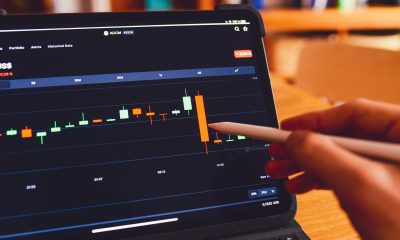Africa
Return to Growth for Stock Market Intermediation Industry in Morocco
The net assets under management by mutual funds will amount to nearly $57.5 million (593 MMDH) at the end of 2021 against $50.8 million (523 MMDH) at the end of 2020, up 13%, after an increase of 11% the previous year. That said, the industry of mutual fund management continues to mobilize savings at the national level, with 537 mutual funds under management.

The stock market intermediation and asset management industries in Morocco performed well in 2021, showing strong resilience despite the uncertain economic environment. Bank Al-Maghrib‘s (BAM) annual report on financial stability outlines the achievements of these two activities over the past year and bodes well for an even better year in 2022.
Read more on the subject and find the latest economic news from around the world with the Born2Invest mobile app.
The good financial basis of the brokerage companies
BAM noted, in its report, that in 2021, “the sector of the stock exchange intermediation has a good financial base, and records an improvement of the consolidated turnover”. Thus, the revenues of brokerage companies have improved after the decline recorded in 2020. As a result, the consolidated turnover of stock market intermediaries stood at $25.5 million (262.6 MDH) in 2021 against $20.4 million (210.4 MDH) in 2020 and $36.1 million (372.2 MDH) in 2019. The improvement of nearly 24.8%, observed between 2020 and 2021, is explained by the 24% increase in transactional volume on the central market, the 49% increase in transactions on the block market, as well as the doubling of the volume of securities contribution operations.
These positive performances have, in turn, had a positive impact on the operating profitability of the brokerage companies. The consolidated net result of the activity reached $6.23 million (64.2 MDH) in 2021 against $2.8 million (28.7 MDH) in 2020, which is equivalent to a jump of 123.6%. The Central Bank notes, in this sense, that 15 out of 17 brokerage companies have generated positive net results in 2021. “The weakness of the results of some independent companies induces a low risk on their financial situation, with limited impacts in case of default, and this, taking into account the various mechanisms of risk mitigation, including prudential rules,” said BAM.
It should also be noted that the stock exchange companies enjoy, on the whole, a good financial structure with consolidated equity of $48.7 million (501.3 MDH) in 2021, slightly improved compared to the previous year, when they had amounted to $48.5 million (499.3 MDH). BAM noted, moreover, that the sector remains relatively concentrated with 30% of the stock exchange companies holding more than 60% of market shares. It should be noted that these companies are all subsidiaries of banking institutions.
The asset management consolidates its weight
As for the market of Undertakings for Collective Investment in Transferable Securities (UCITS), BAM noted that, despite an uncertain economic context, the UCITS management industry still benefits from the confidence of investors. The figures provided by the institution concerning the evolution of assets under management attest to this. The net assets under management by mutual funds will amount to nearly $57.5 million (593 MMDH) at the end of 2021 against $50.8 million (523 MMDH) at the end of 2020, up 13%, after an increase of 11% the previous year. That said, the industry of mutual fund management continues to mobilize savings at the national level, with 537 mutual funds under management, thus consolidating its preponderant weight in the national economic fabric.
The rate of creation of funds is increasing
In its analysis of the stock market, Bank Al-Maghrib also focused on the dynamics of fund creation. It turns out that it continues its upward trend with 35 UCITS created in 2021 after the 28 funds created in 2020. However, “contrary to 2020 during which a tendency to the creation of bond funds had been observed, the year 2021 was characterized by a diversification of the creations which also concerned the categories equities and diversified,” according to BAM.
The favorable evolution of the stock market, and a situation marked by a recovery of the national economy, are the main factors explaining this situation. In detail, we can note that the products of rate remain the most popular, in particular the category of medium and long-term bonds (OMLT). Out of a total of 35 funds created, almost half of them are equity or diversified funds, with 7 and 10 UCITS created, respectively. The “OMLT” category saw its number increase by 12 UCITS. The remaining 6 UCITS created in 2021 are divided equally between the “Money Market” and “OCT” (Short Term Bonds) categories. At the end of 2021, 35% of UCITS, or 188 funds, belong to the “OMLT” category, which corresponds to the profile of institutional investors, the main investors in UCITS.
Management companies improve their performance
The activity and profitability indicators of UCITS management companies improved in 2021, with the latter enjoying a solid financial base overall, in the wake of the good performance of UCITS net assets. Their consolidated turnover amounted to $1.6 million (1.65 billion dirhams) against $1.4 million (1.42 billion dirhams) a year earlier, an increase of 15.8%.
For its part, the sector’s consolidated net income stood at $50.1 million (516.2 MDH) against $43.6 million (449.6 MDH) in 2020, i.e. an increase of 14.8%. As for the profit margin, it remains stable at 31.33% in 2021 against 31.59% in 2020, while the Return On Equity (ROE) showed an increase of 59.01% in 2021 against 56.81% in 2020. Finally, in terms of balance sheet structure, the sector has a good equity/total balance sheet ratio, which stands at 52.73% in 2021, compared with 51.99% the previous year.
__
(Featured image by MabelAmber via Pixabay)
DISCLAIMER: This article was written by a third party contributor and does not reflect the opinion of Born2Invest, its management, staff or its associates. Please review our disclaimer for more information.
This article may include forward-looking statements. These forward-looking statements generally are identified by the words “believe,” “project,” “estimate,” “become,” “plan,” “will,” and similar expressions. These forward-looking statements involve known and unknown risks as well as uncertainties, including those discussed in the following cautionary statements and elsewhere in this article and on this site. Although the Company may believe that its expectations are based on reasonable assumptions, the actual results that the Company may achieve may differ materially from any forward-looking statements, which reflect the opinions of the management of the Company only as of the date hereof. Additionally, please make sure to read these important disclosures.
First published in LES ECO.ma, a third-party contributor translated and adapted the article from the original. In case of discrepancy, the original will prevail.
Although we made reasonable efforts to provide accurate translations, some parts may be incorrect. Born2Invest assumes no responsibility for errors, omissions or ambiguities in the translations provided on this website. Any person or entity relying on translated content does so at their own risk. Born2Invest is not responsible for losses caused by such reliance on the accuracy or reliability of translated information. If you wish to report an error or inaccuracy in the translation, we encourage you to contact us.

-

 Impact Investing1 week ago
Impact Investing1 week agoBNP Paribas Delivers Record 2025 Results and Surpasses Sustainable Finance Targets
-

 Crypto1 week ago
Crypto1 week agoUniswap and BlackRock Partner to Launch BUIDL in DeFi
-

 Cannabis2 weeks ago
Cannabis2 weeks agoScientifically Verified F1 Hybrids Set New Benchmark for Indoor Cannabis Yield and Consistency
-

 Biotech3 days ago
Biotech3 days agoNew Molecular Clues Explain Aggressive Neuroblastoma and Point to Targeted Treatments























